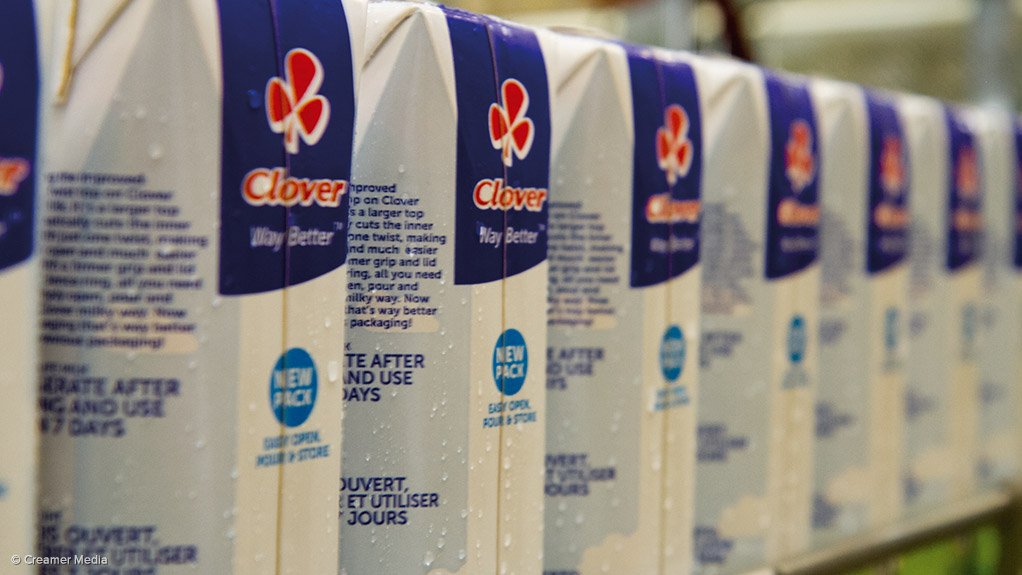JSE-listed dairy products manufacturer Clover has improved its revenue for the year ended June 30 by 6%, to R9.8-billion, despite having faced numerous economic headwinds in the year under review.
“We had a tough year, no doubt. We had a deflationary year in dairy,” Clover CEO Johann Vorster told Engineering News Online in a telephone interview, citing a 5% drop in the company’s selling price.
“So, we had to compensate for that,” he said, citing an aggressive approach with regard to the company’s beverages, or value-added, side of the business, as well as the contribution of newly launched yoghurt and custard products.
The company noted in a statement on Tuesday that higher national milk flow increased its inventory levels substantially in the first six months of the year and that Clover did not increase dairy selling prices until April to protect its market shares in the dairy categories.
“Clover's brands traded in line with expectations, buoyed by solid festive season demand for our beverages. As we had increased beverage portfolio selling prices in July 2015, the increased volumes of the 2015/16 summer delivered an exceptional performance for our beverage brands.”
Clover’s sales increased by 10% to R9.1-billion with overall volume expansion of 9.7%, while its volume and mix changes were primarily the result of the strong 8.1% growth in the national raw milk supply during the 2014/15 financial year.
The company’s cost of sales increased by 8.4%, or R543.4-million, in contrast to its R552.5-million growth in revenue. As a result, Clover’s gross profit percentage decreased from 30% to 28.4% and gross profit increased by 0.3%, or R9.1-million.
However, when excluding the effect of raw milk sales, revenue increased by 7.5%, compared with a 10.6% increase in cost of sales, resulting in a decrease in the gross margin from 30.5% to 28.5%.
Headline earnings a share increased by 8.9%, or 15.3c, to 188.9c a share, while earnings a share were down 2.4% to 185.9c, compared with 190.4c in 2015.
In terms of cost efficiency, Vorster said Clover was “quite innovative with our expenditure in containing our costs this particular year”, highlighting that the company’s cost of distribution declined by 2.3% in the year ended June 30, with other expenses down 7%.
“Over the years we have built a great relationship with our partners/suppliers. This year, we worked very well with them and had a number workshops where we sat down together and looked at how we could do things better, smarter; and in the instances [where we dealt purely with] suppliers we bargained really hard. We had a couple of forward exchange contracts covering us, which was also fortunate.
The result was the development of a “360 package” to ensure that the costs incurred by Clover were “in the right places”.
“It was a phenomenal hard drive by the team to get the efficiencies and balance right this year,” Vorster said, conceding, however, that looking back, he would have implemented the price increase sooner.
“But it is a difficult thing. You build up market share and you don’t want to lose that.”
IN THE PIPELINE
Going forward, Vorster said the company would be actively looking to buy complementary businesses, following the process of repositioning factories, building and expansion.
It was “very difficult” to undertake acquisitions during this time, he noted, saying the company had not wanted to “lose focus”. However, now Clover can focus on executing its strategy of filling the capacities and the asset base that was heavily invested in during the last five years.
“Clover will continue to explore local consolidation opportunities to leverage its existing value chain, and continues to invest in new products to grow a portfolio that is not exposed to dairy price fluctuations, either acquisitively or organically,” the company emphasised.
Clover also pointed out that the industry had been subject to evolving and increasing legislation, and the impact of the recently proposed sugar tax may have far reaching consequences.
“It will impact everyone whose business involves sugar,” Vorster advanced, noting that the company’s cost would increase by about 6% as a result of the new tax, which would be passed on to the consumer.
Consumers, Clover emphasised, remained under pressure and expected discretionary spend to further be affected by rising inflation and resultant interest rate increases, predicting that the recent currency volatility and foreign exchange liquidity could also mute potential growth prospects.
However, a key determining factor for the industry’s success would be rainfall (La Niña) and the resultant milk flow in the upcoming spring, which Clover said would hopefully bring down food and beverage input costs and food price inflation.
Edited by: Creamer Media Reporter
EMAIL THIS ARTICLE SAVE THIS ARTICLE
To subscribe email subscriptions@creamermedia.co.za or click here
To advertise email advertising@creamermedia.co.za or click here













